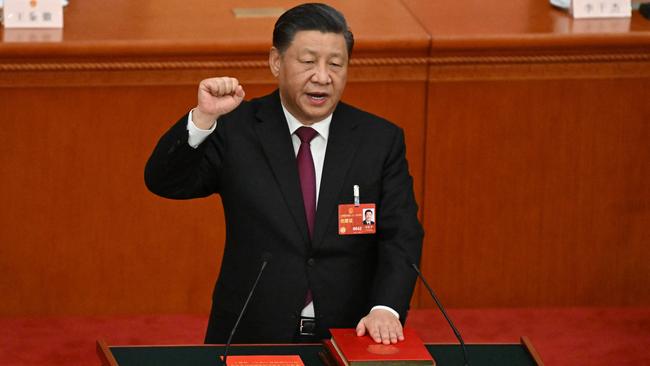China’s rubber stamp secures power trifecta for Xi Jinping
The National People’s Congress also unanimously voted 2952-0 to give him a third term as head of Central Military Commission.

Xi Jinping secured his third term as Chinese President on Friday after unanimously winning a vote that underscored his total dominance of China’s political system.
Delegates at China’s National People’s Congress on Friday also unanimously voted 2952-0 for Mr Xi’s third term as head of the Central Military Commission.
This week’s carefully choreographed political event in Beijing’s Great Hall of the People follows the Communist Party’s congress in October that extended Mr Xi’s position as general secretary.
The 69-year old’s re-election to the three peak roles – as the head of China’s ruling party, the Chinese state and China’s military – cements his position for the next five years as the central organising figure in the rising global power. The son of a senior member of the party’s vanguard generation, could rule China for at least another decade.
“There is this sense of a born-to-rule feeling,” said Christopher Johnson, a former China analyst at the CIA.
For decades, communist China – scarred by the horrors of the dictatorial reign of founding leader Mao Zedong – eschewed one-man rule in favour of a more consensus-based, but still autocratic, leadership.
That model imposed term limits on the largely ceremonial role of the presidency, with Mr Xi’s predecessors Jiang Zemin and Hu Jintao relinquishing power after 10 years in office.
Mr Xi has torn up that succession rule book, abolishing term limits in 2018 and fostering a cult of personality.
The beginning of his unprecedented third term comes as the world’s second-largest economy faces major headwinds, from slowing growth and a troubled real estate sector to a declining birthrate. China’s leaders this week set a relatively modest growth target of “about 5 per cent” for 2023, although defence spending was ramped up by more than 7 per cent.
Relations with the US are also in their most combustible state in generations, with the great powers sparring over everything from human rights to trade and technology.
This week Mr Xi spoke with unusual bluntness about the efforts by America and its allies launch an “all-round containment, encirclement and suppression” of China. He normally uses coded language such as “certain countries” when making such criticism.
Mr Johnson said the Chinese leader had demonstrated a “penchant for creating … a sense of urgency both domestically and in the international sphere to justify his power grab”.
Most international media was sidelined from this week’s political meeting, which until 2019 was the only event at which foreign reporters in China were able to get any access to members of the country’s ruling class.
While established mastheads and broadcasters were mostly kept out of all the activities, a group of more than 60 journalists from Africa, Pakistan, Serbia and Bulgaria and some other countries were given access as part of an “all-expenses paid” outreach trip by Chinese officials. Many have been doing interviews for Chinese party state media throughout the week, as Beijing’s propaganda machine promotes foreign voices to “tell China’s story well”.
Footage of Mr Xi’s swearing in ceremony in Beijing’s Great Hall of the People flooded the highly curated Chinese internet along with praise for the leader.
“The election of President Xi fully embodies the wishes of every Chinese person, conforms to China’s national conditions, and has won the support of all Chinese people!” wrote a widely shared post.
Wang Xiangwei, the former editor-in-chief of the South China Morning Post, warned that “ultra-leftist sentiment” was endangering China’s economic development. “To put it bluntly, if the ultra-leftist sentiment remains unchecked, China’s development risks being derailed, and China’s goal of national rejuvenation – Xi’s ambition to turn the country into a dominant world power by the middle of the century – will remain just a dream,” Mr Wang said.




To join the conversation, please log in. Don't have an account? Register
Join the conversation, you are commenting as Logout